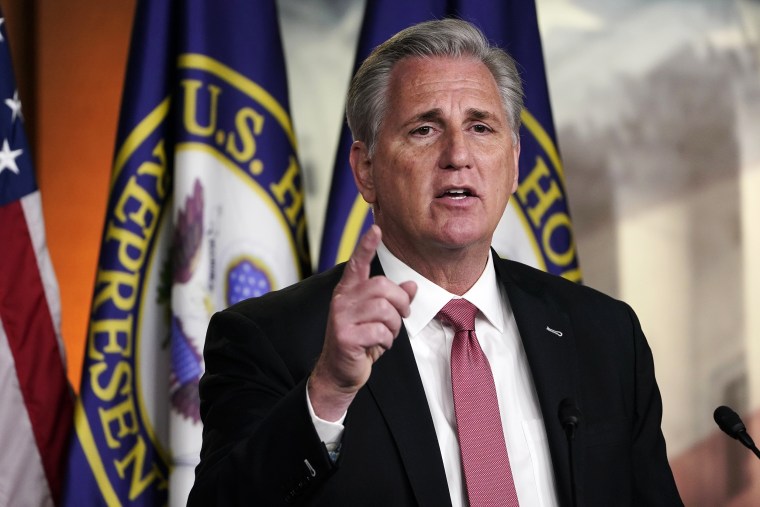On Friday night, just as Senate Democrats were reaching a compromise that allowed their COVID relief package to advance, House Minority Leader Kevin McCarthy (R-Calif.) unveiled a new online video. Did it attack the $1.9 trillion legislation? Perhaps the Republican leader was eager to tout a Republican alternative?
No, as it turned out, McCarthy, at 8:33 p.m. (E.T.) on Friday night, in the midst of a dramatic Senate debate on legislation of historic significance, released a video in which he read a Dr. Seuss book. This was not some kind of exercise in which prominent public figures read to children; it was a political exercise because Republicans are upset that Dr. Seuss Enterprises announced plans last week to pull some decades-old children's books that included racist imagery.
Indeed, it's not just McCarthy: conservative media was far more interested in Dr. Seuss than the American Rescue Plan, and the National Republican Congressional Committee started offering donors copies of "The Cat in the Hat" as a way of enticing campaign contributions.
The Washington Post highlighted the larger context:
If you listened to the Republican Party over the past week, it might have been easy to think that the core planks of its platform were defending a deceased children's author, a decades-old children's toy — and a subspecies of human that went extinct 40,000 years ago. That's because GOP leaders have been vociferously protesting a decision to stop publishing Dr. Seuss books that include racially stereotyped images; the removal of "Mr." from the Mr. Potato Head brand; and President Biden's characterization of ending mask mandates as "Neanderthal thinking."
Let's not forget that Sen. Tom Cotton (R-Ark.), among others, also wasn't pleased when Disney Plus added a disclaimer to some episodes of "The Muppet Show."
To be sure, the politics of cultural grievances is not new. Indeed, the so-called "culture war" has been a potent political force for quite a while. Republican officials, in all likelihood, don't much care about Dr. Seuss and the gender identity of a children's toy, but do care about keeping the GOP base engaged, angry, and writing checks.
If this helps distract attention from a popular COVID relief package that drew unanimous Republican opposition, all the better.
But it's worth pausing to appreciate the qualitative differences between old culture-war fights and new ones. The GOP's traditional culture war focused on issues that had at least some policy relevance -- which is to say, they dealt with issues that elected officials could at least try to affect.
Vote for Republicans and they'll ban abortion. Vote for Republicans and they'll erect Ten Commandments displays. Vote for Republicans and they'll prevent marriage equality. Vote for Republicans and they'll ban pornography. Vote for Republicans and they'll mandate English as the official language. And so on.
Obviously, these were (and in some cases, are) highly contentious cultural and political fights, but there was at least a correlation between the issues and those hoping to make policy changes through elected government offices.
This new approach to the culture war is fundamentally different in that none of these issues can even be conceptually addressed through policy changes. Kevin McCarthy cannot, for example, spearhead a legislative initiative to force Dr. Seuss Enterprises to publish old books with racist pictures. Similarly, Republicans can't pass bills that regulate the branding of Potato Head toys.
None of this falls within the purview of Congress. The old culture war reflected a party that prioritized a socially conservative policy agenda; the new culture war reflects a post-policy party that revels in cultural grievances with no meaningful solutions in mind.
As for the electoral pitch, these GOP leaders are effectively telling conservatives, "Vote Republican and we'll promise to ... be upset about the same stuff you're upset about."
Update: My principal focus here is on culture war efforts at the federal level. At the state level, the GOP's culture war focus clearly includes issues with a legislative focus, including bills related to reproductive rights and the rights of transgender Americans.

